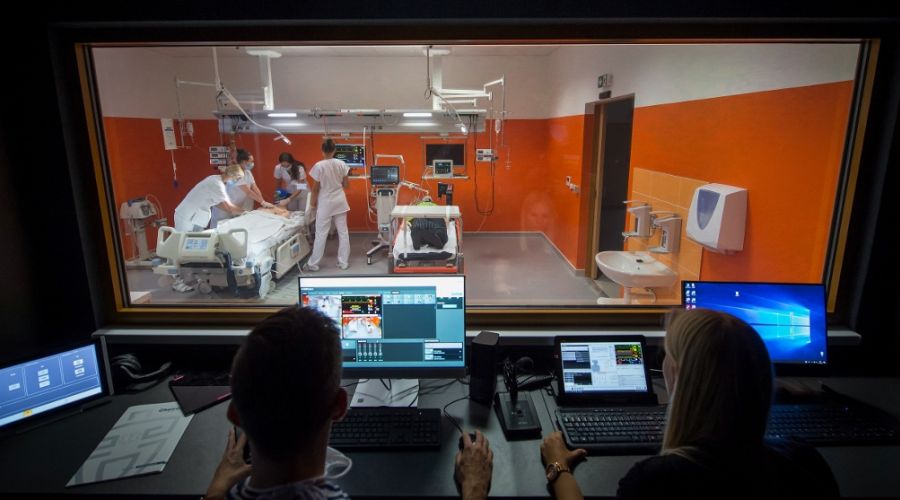The international intensive week will bring pedagogues from European countries and Turkey to the FHSS USB Simulation Centre

From August 22, the Faculty of Health and Social Sciences of the University of South Bohemia will host the participants of the International Intensive Week in order to exchange experience with simulation teaching in nursing, improve the skills, make the use of this teaching method more efficient, and establish closer mutual cooperation. The organizers expect about forty educators from 13 European countries and Turkey.
It is the largest event to date, during which the FHSS USB opens the Simulation Centre to the professional public. The head of the Simulation Centre Mgr. František Dolák, Ph.D. said: "The main goal is to improve the quality of teaching by using modern methods. “We offer our students new approaches that can be applied in teaching general and paediatric nursing, midwifery and rescue service." The FHSS USB opened the first comprehensive simulation centre for non-medical health fields in the Czech Republic in autumn 2020. Experts from the FHSS USB gathered inspiration for this project in Finland, Spain, the USA, and Latvia. Several colleagues are now heading to České Budějovice to see the new specialized rooms for healthcare workers which faithfully imitate the reality.
The weekly meeting takes place in U Výstaviště Street 26 building, where hospital rooms, a delivery room, an intensive care unit, and an authentic ambulance cabin are located in the basement. Simulation teaching is made possible by control rooms and other spaces in which pedagogues monitor and evaluate the work of students, who are guided to be as independent as possible. Everything is equipped with functional medical devices and patients are represented by sophisticated computer-controlled dummies that imitate breathing, pulse or heart activity, etc. They can be connected to different devices; simulators react to the procedures performed and allow communication between students and teachers.
Numerous different situations that health professionals have to deal with can be pre-programmed. These scenarios will represent an important part of the programme of the International Intensive Week. Morning sessions which other foreign participants can also join online will offer theory and discussion. Afternoons will be dedicated to workshops held directly in the individual halls of the Simulation Centre. František Dolák explained: "We approached all the partner faculties where Nursing is taught. Among other things, we offered them space so that they can present their own scenarios and participate in the exchange of experience, which is what we are primarily interested in." He specified that the organizing Institute of Nursing, Midwifery and Emergency Care of the FHSS USB invited colleagues who already have simulation centres in their faculties, as well as those who are just thinking about them and want to get to know this form of teaching more closely.
The Faculty of Health and Social Sciences of the USB has long-term focus on finding innovative teaching options that will allow students to have the closest possible connection with practice and the best possible training of all skills in the most realistic environment possible, without putting the patient at risk by making beginner student mistakes. That is why our faculty wants to support public schools that already use simulation teaching to cooperate to a greater extent in the future. The present is in favour of such cooperation. Earlier, there was an effort to protect one's know-how in these unique and expensive projects but the development progressed and showed how necessary cooperation in this area is. The dean Mgr. Ivana Chloubová, Ph.D. said: "I am very happy that the offer of our faculty has aroused such great interest among colleagues from abroad. For us, this is not only an important opportunity to exchange experience and gain new ideas, but also an opportunity to contribute to the improvement of the teaching of these subjects at other faculties around the world - including those countries where we previously drew inspiration."
The two-story building of the Simulation Centre for Health-oriented Fields, which is an extension to the existing FHSS USB building, cost about 58 million crowns including equipment. The centre was financed by the EU Research, Development and Education Operational Programme (co-participation of the faculty in the amount of 5%). Construction took two years and classes started there in the autumn of 2020. By observing strict anti-epidemic measures, it was possible to maintain classes here even during the months when most schools were closed due to the covid-19 pandemic. Among other things, she emphasized the indispensability of well-prepared nurses and other health professionals, to which teaching in the simulation centre contributes significantly.
Program HERE:
